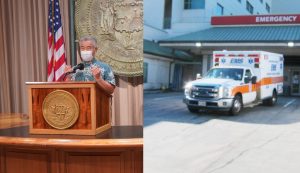From the governor: It’s up to all of us to stop the surge
Posted on Aug 25, 2021 in Capitol Connection, Featured, Main“The fight has changed.” That stark assessment from Dr. Libby Char, Department of Health director, underscores the urgency of the moment as Hawai‘i and the rest of the nation battle the highly transmissible Delta variant. Protests about personal freedoms pale against the alarming case counts, hospital beds filled with younger, unvaccinated patients, healthcare worker shortages, and unprotected keiki who have returned to school. The best way to curb the spread of infection is to get vaccinated, say public health experts, the governor and the county mayors. Government can’t do it alone. That’s why they’re urging — no, pleading — with people to get their shots, wear their masks and do their part to stop this dangerous surge.

Gov. Ige urged the public to get vaccinated and tested. More COVID-19 cases were reported among children, with some hospitals ‘at capacity.’
Q: What more can people do to stop the spread of the Delta variant?
A: We’ve struggled with that since the Fourth of July weekend. The Delta variant is a very different strain of the coronavirus and significantly more transmissible. Obviously, vaccination is the best solution. We know it’s the unvaccinated 18-to-44-year-olds who are getting infected. We’re averaging twice what we saw at the peak last year. Our healthcare workers are beyond exhaustion. They’re frustrated because they’re working so hard to keep everyone safe, and this is a preventable situation. The best way to stop this COVID surge is for everyone to take personal responsibility because government can’t be everywhere. We’ve seen more COVID clusters from people who went to work when they were sick. That’s something we can’t do anymore.
Q: What would you say to those who argue it’s their right to not be vaccinated?
A: It’s unfortunate that some are listening to misinformation on social media instead of our doctors and nurses on the front lines. If someone is unvaccinated, it impacts all of us. In Hawai‘i, we know we have to take care of each other. We’ve made vaccine information available in different ways, but people are more inclined to listen to the advice of a friend or family member. More than 90% of those hospitalized with COVID in this spike are unvaccinated, and they’re infecting others. We can’t keep asking our healthcare heroes to save us when we can save ourselves with the choices we make.
Q: What about health passes to enter restaurants or changes to the Safe Travels program?
A: We’re evaluating the possibility of both health passes for indoor venues and changes to Safe Travels. We’re also seeing more support for requiring vaccinations or testing for company employees because that creates a healthier environment for everyone. I do appreciate the many businesses providing incentives through our #HIGotVaccinated program.
Q: Why should state and county workers either be vaccinated or tested for COVID-19?
A: Many state and county employees provide essential services that must continue during the pandemic. We also wanted to do everything we could to keep our hospitals from being overrun. Locally and nationally, more hospital systems and government agencies are requiring employees to get vaccinated or tested to protect everyone they come in contact with. It’s a choice we’re asking employees to make for the safety of the whole community.
Q: Why is the 70 percent fully vaccinated benchmark not a good target anymore?
A: With the higher transmissibility of the Delta variant, we’re going to need more community protection. Just look at the case counts in the last 7 to 10 days. If we can’t control the virus, our hospitals will be overrun. That’s what scares me the most. If that happens, we’ll have to ration care and more people will die. In the worst-case scenario, we’ll be back to a lockdown.
Responding to the Delta surge
More free COVID-19 testing is now available on the neighbor islands, and expansion is expected on O‘ahu. Pre-registration at https://preventcovidhi.com/ is recommended. The program augments Hawai‘i’s network of free community testing with options available at HawaiiCOVID19.com/testing.
Also, the Department of Health has announced that several hundred experienced healthcare professionals from out of state will be deployed to 19 hospitals statewide in the coming weeks with funds from the Federal Emergency Management Agency (FEMA). Hawai‘i will receive $46 million in federal funding to bring in traveling healthcare workers through ProLink Healthcare.